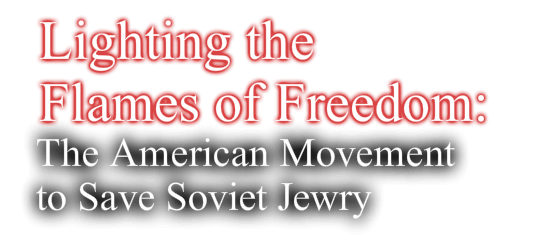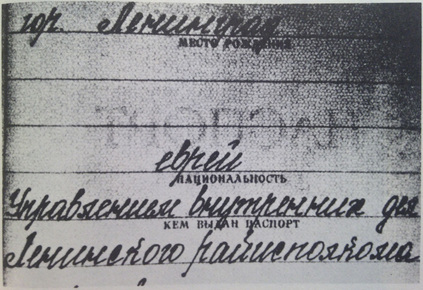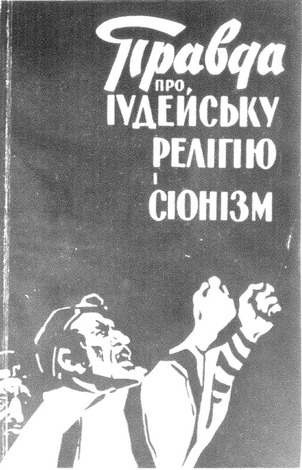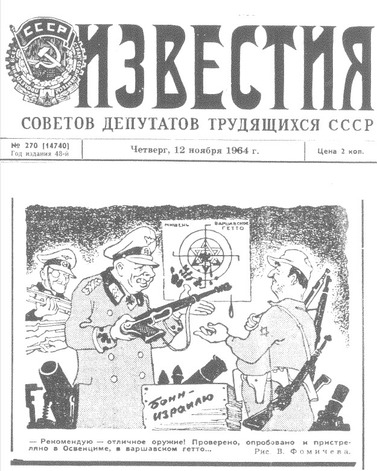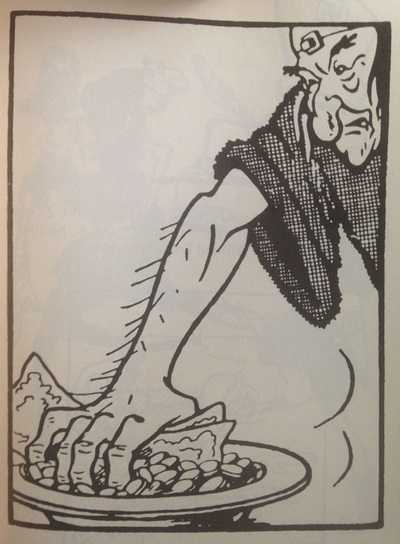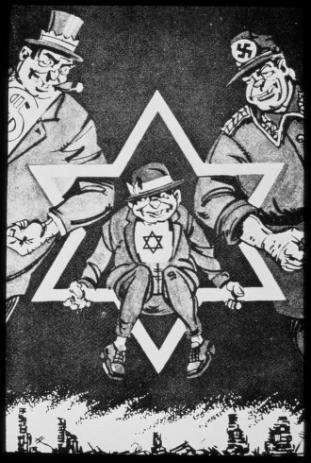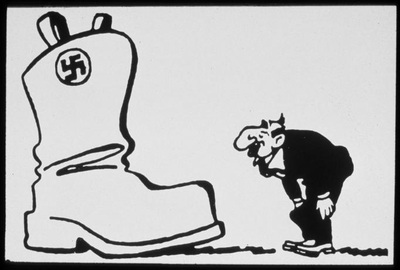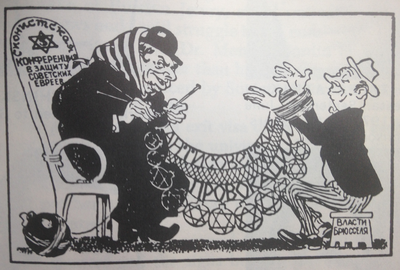"At the end of World War II, nearly three million Jews were trapped inside the Soviet Union. They lived in a paradox: unwanted by a repressive Stalinist state yet forbidden to leave." - When They Come for Us We'll Be Gone by Gal Beckerman
|
"I happened to be a Jew. I didn't know what it meant but it was written in my identity card: Yevreika. My Russian classmates insulted each other with this word. I saw it written in chalk on the walls of the houses. It was written very distinctively in my identity card and legalized by a round seal of the government. At the beginning of every school year the teacher asked everybody: 'Your name and nationality'. I answered in whispers." - Alla Rusinek in How They Taught Me I Was a Jew
|
Before Our Eyes, produced by the Cleveland Council on Anti-Semetism, 1964
|
|
A Soviet internal passport with the word Evrei (Jew) at the center.
|
"The Soviet Union officially recognizes Jews as a nationality. In the personal identification papers which all Soviet citizens carry (the internal 'passport'), Jews must list their nationality as "Jewish" (Yevrei) just as other nationalities-such as Russians, Ukrainians, Georgians and others-must list theirs." - The Status of the Jews in the Soviet Union by Moshe Decter in Foreign Affairs magazine, 1963
Interview with Gal Beckerman, author of "When They Come for Us We'll be Gone", on the Vox Tablet podcast
|
|
Alexander (Sasha) Luntz, Soviet Jew and Dissident, Personal Inteview
|
The Status of the Jews in the Soviet Union, was a 1963 article in the magazine Foreign Affairs - the first of its kind to bring attention to the plight of Soviet Jews.
|
|
"At the beginning of the revolution we had many Jews in leading party and government organizations. Jews were perhaps more educated, more revolutionary, than the average Russian. After that we formed new cadres.... [Pervukhin interjects] Our own intelligentsia. [Khrushchev]: If Jews were now to occupy the leading posts in our republics, this would of course arouse unhappiness among the indigenous population." - Interview with Nikita Khrushchev accompanied by Mikhail Pervukhin in Réalités magazine, May 1957
|
While Khrushchev fervently claimed that "we are not anti-Semites," he and Pervukhin both regarded Jews as not "our own" and alien, and accepted antisemitism as a "fact of life" - unwilling to play the political cards to fight it.
|
Question: "...were you attending synagogue?"
|
"I am a Jew. I want to live in the Jewish state. This is my right... I want my children to study in a school in the Hebrew language. I want to read Jewish papers. I want to attend a Jewish theater. What's wrong with that? What is my Crime?" - Boris Kochubiyevsky in an open letter to Soviet Communist Secretary Leonid Brezhnev and Ukrainian Party Secretary Petro Shelest, for which he was sentenced to three years in labor camp.
|
"Socialism, Marxism-Leninism, Marxist philosophy, Stalinism. Those were supposed to replace religion." - Mila Vasser Anderson, former Soviet Jew, interview August 2000
|
English translation: The Truth About the Jewish Religion and Zionism. Photo Courtesy of the Western Reserve Historical Society
|
1964 political cartoon from the Russian newspaper Izvestia. English Translation: "Recommended- great weapon! Checked, tested to adjust at Auschwitz, the Warsaw Ghetto Uprising...." Photo courtesy of the Western Reserve Historical Society
|
"In sum, Soviet policy places the Jews in an inextricable vise. They are allowed neither to assimilate, nor live a full Jewish life, nor to emigrate (as many would wish) to Israel or any other place where they might live freely as Jews" - The Status of Jews in the Soviet Union, Moshe Decter
Click to display full image and explanation. Images from Let My People Go: Today's Documentary Story of Soviet Jewry's Struggle to be Free
